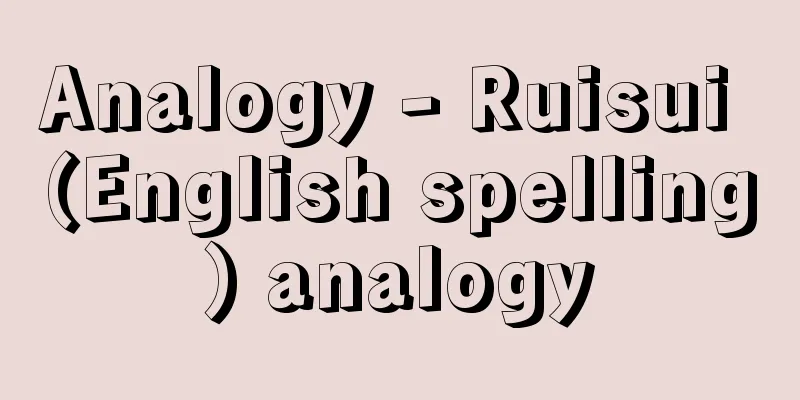Analogy - Ruisui (English spelling) analogy

|
Also called analogy. Recognizing that two things have something in common, we infer that the other has a different quality that is seen in one thing. We can call it reasoning by analogy. For example, if you become friends with a hardworking foreigner, and then meet another person from the same country as that foreigner, and assume that she will also be hardworking, this is a way of thinking based on analogy. In other words, based on the commonality of having the same nationality, you assume that the quality of being hardworking will also be common. In fact, this analogy may be correct at times, but it may also be incorrect. Noticing that the weather and people's emotions are changeable, and assuming that there must be an emotional god behind the sky, is also an analogy, but most modern people would not support this analogy. As such, analogy is not always a reliable method of reasoning. However, it has been reported in the history of science that analogies made by people with good intuition often lead to great discoveries. [Yoshida Natsuhiko] Analogy in linguisticsSuppose there is a word form A, a related word form A' (for example, a form that A has "conjugated," a form derived from A, or the form that gave birth to A), and a word form B that has some similar properties to A (for example, belonging to the same part of speech as A). In this case, when searching for a word form X for B that is equivalent to A' in function, the same rule is followed in terms of form as well, and the word form B' is used as X. In other words, A:A'=B:X, and X=B' is searched for. When the relationship between A and A' in terms of both form and function is recognized as being strong and common, the psychology of trying to establish a parallel relationship with B is at work, and this is how B' is searched for. For example, let's imagine a case where someone who already knows that the imperative form of "sho-ku" is "sho-ke" learns the verb "shi-su" for the first time and wonders what its imperative form is. In this case, it would be an analogy to find that sho-ku:sho-ke = shi-su:X, and X = shi-se. Such analogies are often spot on, and language acquisition is only possible through analogy. On the other hand, there are also cases where a form that is not actually used is created by analogy. Let us classify them as follows: (1) When the very act of finding X is irrelevant (such as when a person from Tohoku knows that removing the "ko" from words like "tori-ko" and "nabe-ko" makes the standard form, and so ends up just saying "taba" for "tobacco"). (2) When other rules should be applied to find X (such as when the imperative form of "mi-ru" is written as "mi-re" following the writing of "kaku" (writing ke). Since "mi-ru" is a one-step conjugation, normatively it should be "mi-ro"). (3) When B is an exception to the application of the proportional formula (such as when the past tense of "give" is called "gived"). (4) When there should be no problem in applying the proportional formula to B, but when B' happens to not be used in reality (such as when "science" is called "kagaku-suru" following the example of "study": "study suru"). When a form that is not an existing form is created by analogy in this way, it is often rejected as a misuse, but sometimes the form created by analogy gains strength and becomes widely used as a new form. Among the above (2) to (4), (4) is probably the most likely to be accepted as an analogical form. Also, there are cases where there is already another form (ancient form, normative form) B″ other than B′ that corresponds to X, and cases where there is nothing. In general, it is thought that when there is no competing form B″, the analogical form B′ is more likely to gain strength and become established. However, even if B″ exists, there are cases where the analogical form B′ can displace it or coexist with it. For example, “mikaranu” is an example of the above (2), where normatively it should be “mikaranu” (= B″), but “mikaranu” has become firmly established. As a special case of (4), when there is a word form that appears to be a derived form of another word but has no corresponding form, the latter can be derived from the former by inference (for example, the verb typewrite can be derived from the noun typewriter). This is called back-formation. When a linguistic phenomenon is already in a state where the analogical proportional formula holds, it is said to be in a fairly stable state, and the possibility of language change to a state where the analogical proportional formula does not hold is generally small. On the other hand, when the analogical proportional formula does not hold, it often changes to a state where it does hold. Or, even if a certain proportional formula holds, it may change to a state where a different proportional formula that further strengthens unity holds (the fact that both one-stage and two-stage verbs in Japanese became one-stage verbs can be considered an example of this type of phenomenon). In this way, the psychological action of analogy can be a factor in maintaining the state of language or a factor in promoting language change, but in either case, it generally acts as a factor that strengthens unity in the language system (at least in part of it). I have explained above about word morphology, but phenomena that can be considered analogies are often seen in syntax, writing, pronunciation, and so on. [Yasuhito Kikuchi] Source: Shogakukan Encyclopedia Nipponica About Encyclopedia Nipponica Information | Legend |
|
類比またはアナロジーともいう。二つの物事に共通点があることを認めたうえで、一方の物事にみられるもう一つの性質が他方にもあるだろうと推論すること。たとえ話による推論といってもよい。たとえば、勤勉な外国人と友人になったあとで、その外国人と同じ国の、別の人に会ったとき、彼女も勤勉だろうと考えるのは、類推にたった考え方である。つまり、国籍が同じであるという共通点をもとにして、勤勉であるという性質も共通だろうと考えているからである。事実、この類推は当たることもあるだろうし、外れることもあるだろう。天気と人の感情とが変化しやすいことに目をつけ、天の背後に感情の激しい神がいるだろうと考えるのも類推だが、この類推は現代人の多くは支持しないだろう。このように、類推はかならずしもつねに頼りになる推論方法ではない。しかし、直観に恵まれた人の類推が大発見のきっかけになることもしばしばあることは、科学史などで報告されている。 [吉田夏彦] 言語学における類推語形Aと、これに関係ある語形A′(たとえばAが「活用」した形、Aから派生した形、あるいは逆にAを生み出すもとになった形など)、および、Aとなんらかの点で類似した性質をもつ(たとえばAと同じ品詞に属する)語形Bがあるとする。このとき、Bについて、機能のうえでAに対するA′に相当する語形Xを求めるにあたり、形のうえでもこれに倣って、同じ要領を当てはめた語形B′をもってそのXとすること。すなわち、いわばA:A′=B:Xとして、X=B′と求めること。AとA′との間に語形、機能の両方について成り立っている関係が有力で一般性の高いものと認められる場合に、Bについてもこれと並行的な関係を成り立たせようとする心理が働く結果、このようにしてB′を求めるわけである。 たとえば、「書ク」の命令形が「書ケ」であることをすでに知っている者が、「志ス」という動詞を初めて知り、その命令形は何かを考える場合を想定してみよう。この場合、書ク:書ケ=志ス:X、X=志セ、として求めるのが類推である。こうした類推は多くの場合は的(まと)を射ているのであり、言語の修得は類推があってこそ可能なのである。 一方、実際には用いられていない形を類推によってつくってしまう場合もまたある。次のように分類してみよう。(1)Xを求めようとすること自体が的外れな場合(東北の人が「鳥コ」「鍋(なべ)コ」などの「コ」をとれば標準語形になることを知り、「タバコ」についても「タバ」とだけいってしまったというような場合)。(2)他の規則を適用してXを求めるべき場合(書ク:書ケに倣って「見ル」の命令形を「見レ」というような場合。「見ル」は一段活用だから規範的には「見ロ」というべきところ)。(3)Bが、当該の比例式適用の例外になっている場合(giveの過去形をgivedというような場合)。(4)Bに当該の比例式を適用すること自体に問題はないはずなのだが、たまたまB′が現実に用いられていない場合(「勉強」:「勉強スル」などに倣って、「科学」についても「科学スル」というなど)。 このように既成の形ではない形を類推によってつくった場合、多くは誤用として斥(しりぞ)けられてしまうが、ときには、類推でつくられた形が力を得て新しい形として広く用いられるようになる場合もある。前出の(2)~(4)のなかでは、一般におそらく(4)がもっとも、類推形が受け入れられやすいであろう。また、Xに相当するものとして、B′以外にすでに他の形(古くからの形、規範的な形)B″が存する場合となにも存しない場合とがあるわけだが、概して、競合する形B″が存しない場合のほうが、類推形B′が力を得て定着しやすいと想像される。だが、B″が存しても、類推形B′がこれを駆逐したり、これと併存したりすることもある。たとえば「無理カラヌ」は前出(2)の例で、規範的には「無理ナラヌ」(=B″)というはずのところだが、「無理カラヌ」がすっかり定着している。なお、(4)の特別な場合として、ある語の派生形のようにみえる語形があって、派生のもとになる形に相当するものがないとき、前者から後者を逆に類推でつくりだす場合があり(たとえば名詞typewriterから動詞typewriteをつくる)、これをとくに逆形成back-formationとよんでいる。 ある言語現象が、類推の比例式が成り立つ状態にすでにある場合、それはかなり安定した状態といえ、類推の成り立たない状態へと言語変化がおこる可能性は一般に小さい。一方、類推の比例式が成り立たない状態にある場合、成り立つ状態への変化がおこることはしばしばある。あるいは、ある種の比例式が成り立っていても、統一性をさらに強める別の比例式が成り立つ状態へと変化することもある(日本語のかつての一段動詞、二段動詞がともに一段動詞になったのもその種の現象とみなせる)。このように類推という心理作用は、言語の状態を保持する要因となる場合も、言語変化を促す要因となる場合もあるが、いずれにせよ、一般にその言語体系(の少なくとも一部分)における統一性を強める要因として働く。 以上、語形について説明してきたが、構文、表記、発音などに関しても類推とみなしうる現象はよく見受けられる。 [菊地康人] 出典 小学館 日本大百科全書(ニッポニカ)日本大百科全書(ニッポニカ)について 情報 | 凡例 |
<<: Lewis and Clark Expedition
Recommend
Notke, B.
...In the second half of the 14th century, the Pa...
Public cemetery - Kyodobochi
The cemetery is a place where the dead are buried ...
Ctenocephalides felis (English spelling) Ctenocephalidesfelis
…[Okumoto Daizaburo]. … *Some of the terminology ...
Astable Multivibrator - Astable Multivibrator
…(2) If the two coupling circuits are configured ...
Yuzaki
The name of a place in Shikinoshimo County, Yamato...
Hikoichi
Hikoichi is the protagonist of a comedy tale passe...
Child soldier - Shounenhei
The mobilization of underage boys as soldiers was ...
Joint defense
In contrast, the new treaty (concluded in January...
School consolidation - school consolidation
...However, the problem of education in remote ar...
Cornstarch - corn starch
Starch extracted from corn kernels. Corn is soake...
Inokashira Park
A park in Musashino City, Tokyo. Commonly known as...
Hokuriku Expressway
One of the "Seven Roads" since ancient ...
Interest rate policy
It is a monetary policy tool in which the central...
Rubble movie - rubble movie
...Following Italy's Neorealism just after Wo...
Chordphones
...For this reason, when classifying musical inst...









